150 Best Spelling Riddles Test Your Word Power with Brain Teasing Puzzles
Want to put your word skills to the ultimate test? Prepare for some head-scratching fun with spelling riddles! These brain teasers challenge your knowledge of orthography and wordplay in unexpected ways.
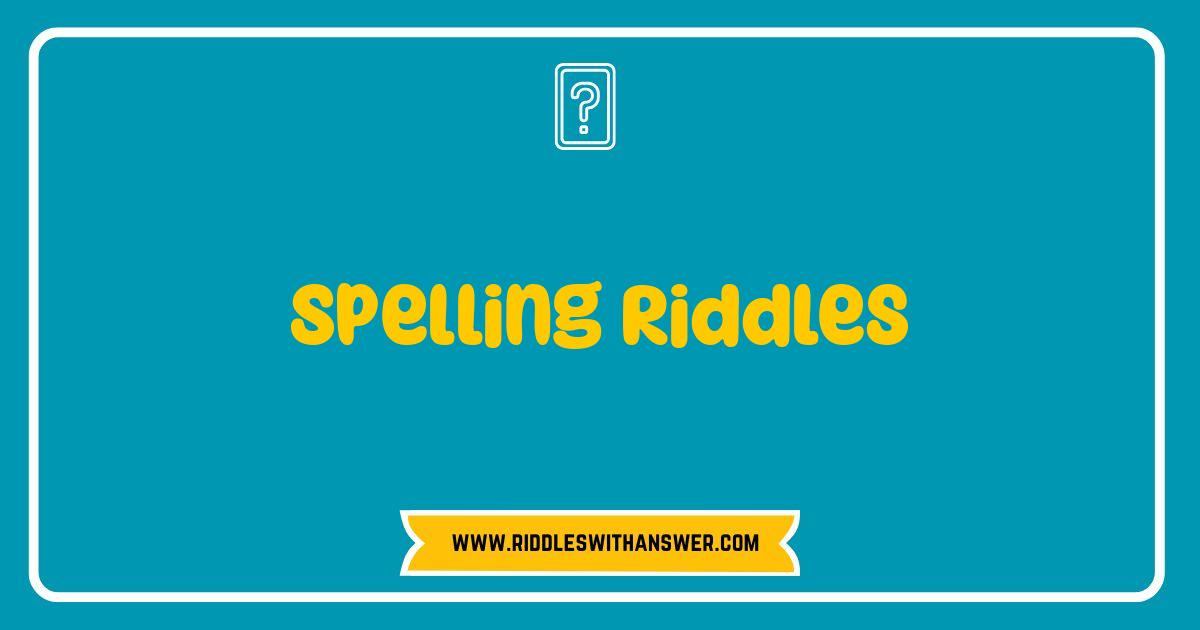
Forget crosswords – we’re diving into the delightful world where letter arrangements and pronunciation become clues. Get ready to think outside the box, because these aren’t your average spelling tests.
Ready to unlock the answers? Let’s explore the fascinating and tricky world of spelling riddles that will leave you saying, “Aha!”
Best Spelling Riddles Test Your Word Power with Brain Teasing Puzzles
Riddle: I gain a letter and become a group, then I might be sweet for your soup.
Answer: Pea, Peal, Peel
Riddle: I’m a number, but add a letter and I’m a place to be.
Answer: One, Zone
Riddle: I am a drink, rearrange me, I sink.
Answer: Tea, Ate
Riddle: I start with ‘e’, end with ‘e’, and contain only one letter. What am I?
Answer: Envelope
Riddle: I’m a word that’s easy to misspell, but I’m crucial for telling a tale.
Answer: Narrative
Riddle: I start with ‘p’, end with ‘e’, and contain a thousand.
Answer: Page
Riddle: I’m a type of weather, add a letter and I’m a type of metal.
Answer: Rain, Train
Riddle: I am a color, change my first letter to a ‘b’ and I become sad.
Answer: Blue, Blue
Riddle: I’m a season, take away two letters and I’m a criminal.
Answer: Autumn, Outlaw
Riddle: I am a fruit, change my first letter and I am a large fan.
Answer: Plum, Flume
Riddle: I am a rodent, add a letter and I am a star.
Answer: Rat, Star
Riddle: I am a feeling, remove a letter and I am an illness.
Answer: Anger, Angina
Riddle: I’m a word that’s often silent, yet crucial for ‘hour’ and ‘honest’ alignment.
Answer: H
Riddle: I am a type of footwear, change my first letter and I become a vessel for liquids.
Answer: Shoe, Jug
Riddle: I am a vegetable, add a letter and I am a place to keep animals.
Answer: Pea, Pen
Spelling Riddles: The Brain-Teasing Wordplay
Unleash your inner word wizard with Spelling Riddles! These brain-teasing puzzles challenge your spelling skills in a fun, engaging way. Decode hidden words, unscramble letters, and crack clever clues. Perfect for wordplay enthusiasts of all ages, Spelling Riddles offer a delightful mental workout, proving that spelling can be surprisingly entertaining!
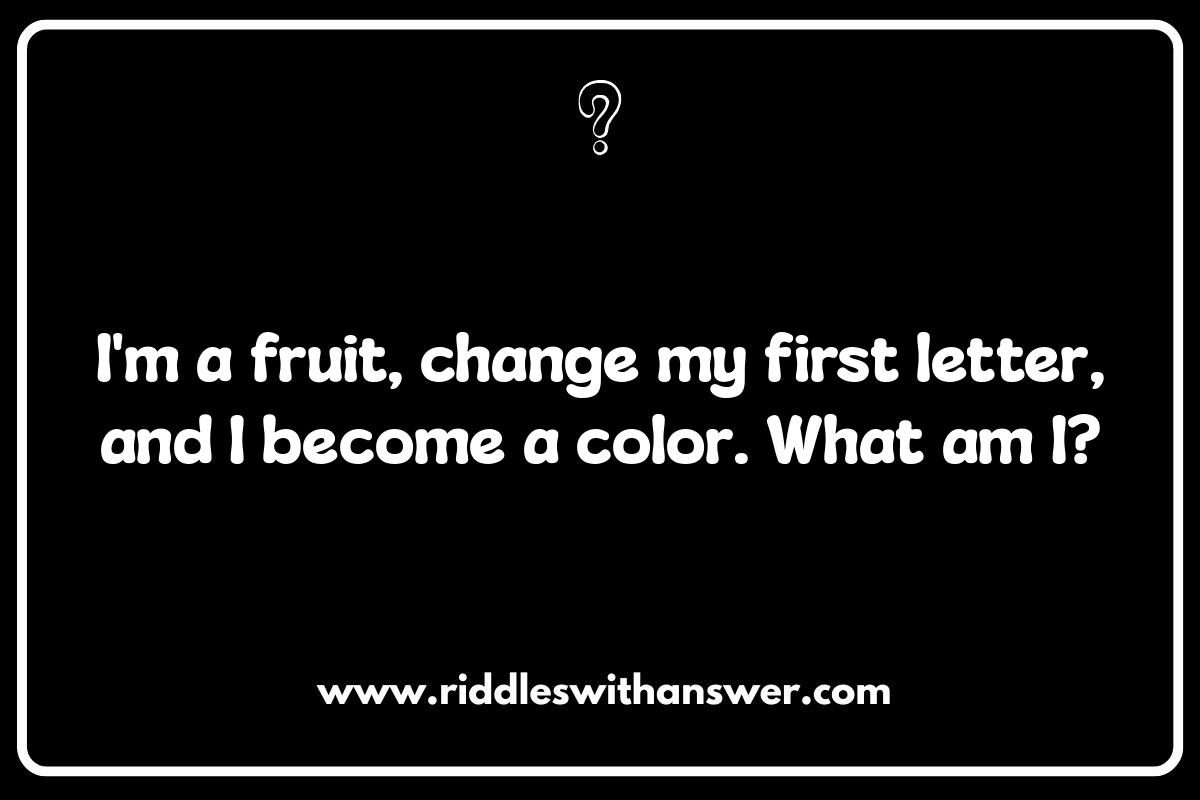
Riddle: I’m a fruit, change my first letter, and I become a color. What am I?
Answer: Orange
Riddle: I am a group of people. Take away a letter, and I become sick. What am I?
Answer: ill
Riddle: I am a day of the week. Remove my last letter, and I am a method of payment. What am I?
Answer: Friday
Riddle: I am a type of house. Change my first letter, and I am a tool used for moving snow. What am I?
Answer: Shovel
Riddle: I am a large body of water. Remove a letter, and I am what you do to a door. What am I?
Answer: Ocean
Riddle: I am a number. Add a letter, and I am a place to swim. What am I?
Answer: Pool
Riddle: I am a type of bird. Change my first letter, and I am a tool used for cutting wood. What am I?
Answer: Saw
Riddle: I am a place to sleep. Change my first letter, and I am a boat. What am I?
Answer: Bed
Riddle: I am a type of insect. Change my first letter, and I am a place to keep animals. What am I?
Answer: Farm
Riddle: I am a container for liquids. Change my first letter, and I am footwear. What am I?
Answer: Boot
Riddle: I am a type of nut. Change my first letter, and I am a small boat. What am I?
Answer: Row
Riddle: I am a group of words that rhyme. Change my first letter, and I am a crime. What am I?
Answer: Verse
Riddle: I am a type of meat. Remove my first letter, and I am something you can see with. What am I?
Answer: Eye
Riddle: I am a long, narrow mark. Remove my first letter, and I am to be dishonest. What am I?
Answer: Lie
Riddle: I am a number. Take away my first letter, and I become even. What am I?
Answer: Seven
Unlocking the Logic Behind Spelling Riddles
Spelling riddles seem like wordplay magic, but there’s logic hidden in their letter jumbles! Unlocking that logic means understanding how words sound, look, and relate to each other. By thinking creatively about letter combinations and their meanings, you can crack the code and reveal the riddle’s clever solution.
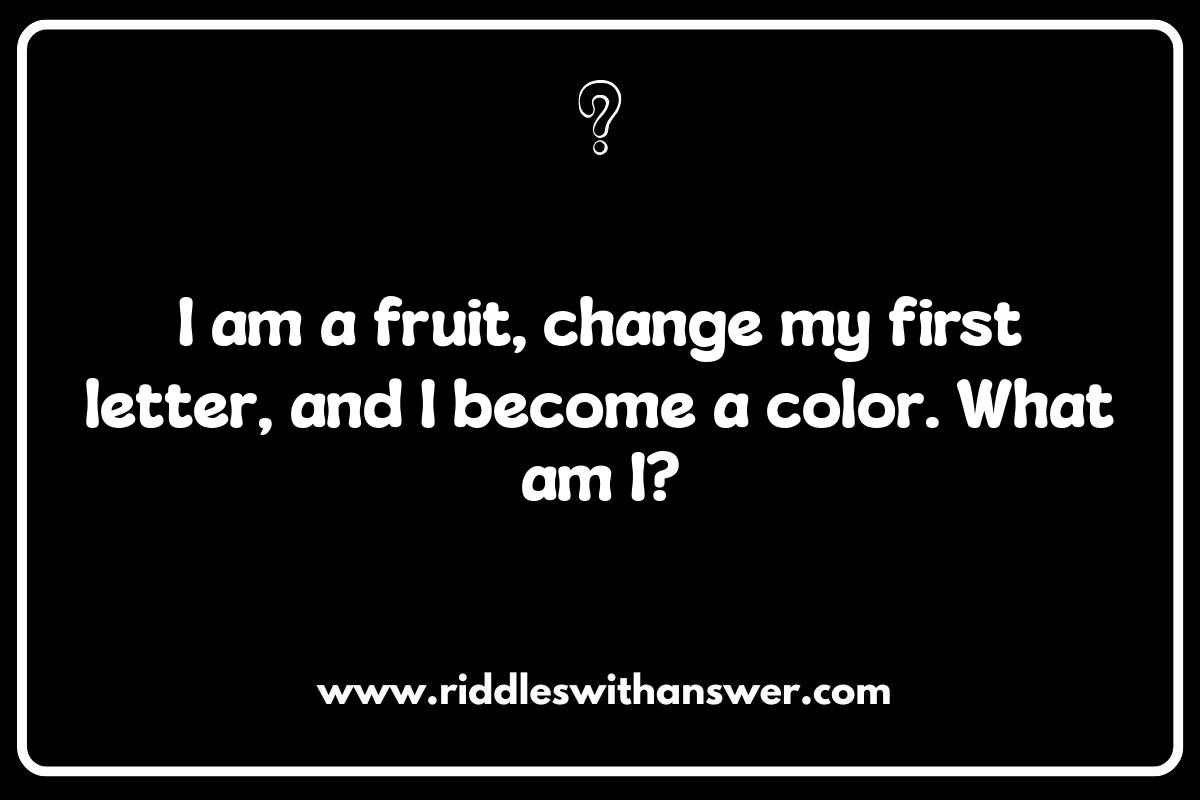
Riddle: I am a fruit, change my first letter, and I become a color. What am I?
Answer: Orange
Riddle: I am a type of house. Change my first letter, and I am a tool used for moving snow. What am I?
Answer: Home/Shovel
Riddle: I am a vegetable, add a letter and I am a place to keep animals. What am I?
Answer: Pea/Pen
Riddle: I am a type of meat. Remove my first letter, and I am something you can see with. What am I?
Answer: Ham/Eye
Riddle: I am a rodent, add a letter and I am a star. What am I?
Answer: Rat/Star
Riddle: I am a drink, rearrange me, I sink. What am I?
Answer: Tea/Eat
Riddle: I am a type of footwear, change my first letter and I become a vessel for liquids. What am I?
Answer: Shoe/Jug
Riddle: I am a type of bird. Change my first letter, and I am a tool used for cutting wood. What am I?
Answer: Wren/Saw
Riddle: I am a color, change my first letter to a ‘b’ and I become sad.
Answer: Blue
Riddle: I am a lake, but I am not in one single country. What am I?
Answer: Lake Victoria
Riddle: I am a mountain, holy and high, where legends whisper and eagles fly. Pilgrims climb my slopes with care. What am I, a place of sacred prayer?
Answer: Mount Everest
Riddle: I am a sea between Europe and Asia, and a country shares my name. What am I?
Answer: Black Sea
Riddle: I am the largest rainforest on Earth, teeming with biodiversity and vital for the planet’s air. A mighty river flows through me. What am I?
Answer: Amazon Rainforest
Riddle: I am a country, an island, and a continent all rolled into one, known for unique wildlife and vast landscapes. What am I?
Answer: Australia
Riddle: I am a country in Europe, shaped like a boot, known for pizza, pasta, and a tasty fruit. What am I?
Answer: Italy
Spelling Riddles for Kids: Fun and Educational Challenges
Unleash your child’s inner word wizard with Spelling Riddles! These brain-teasing puzzles transform spelling practice into an exciting game. Kids will decode clues, unravel letter combinations, and boost their vocabulary while having tons of fun. It’s a playful way to reinforce spelling skills and ignite a love for language.
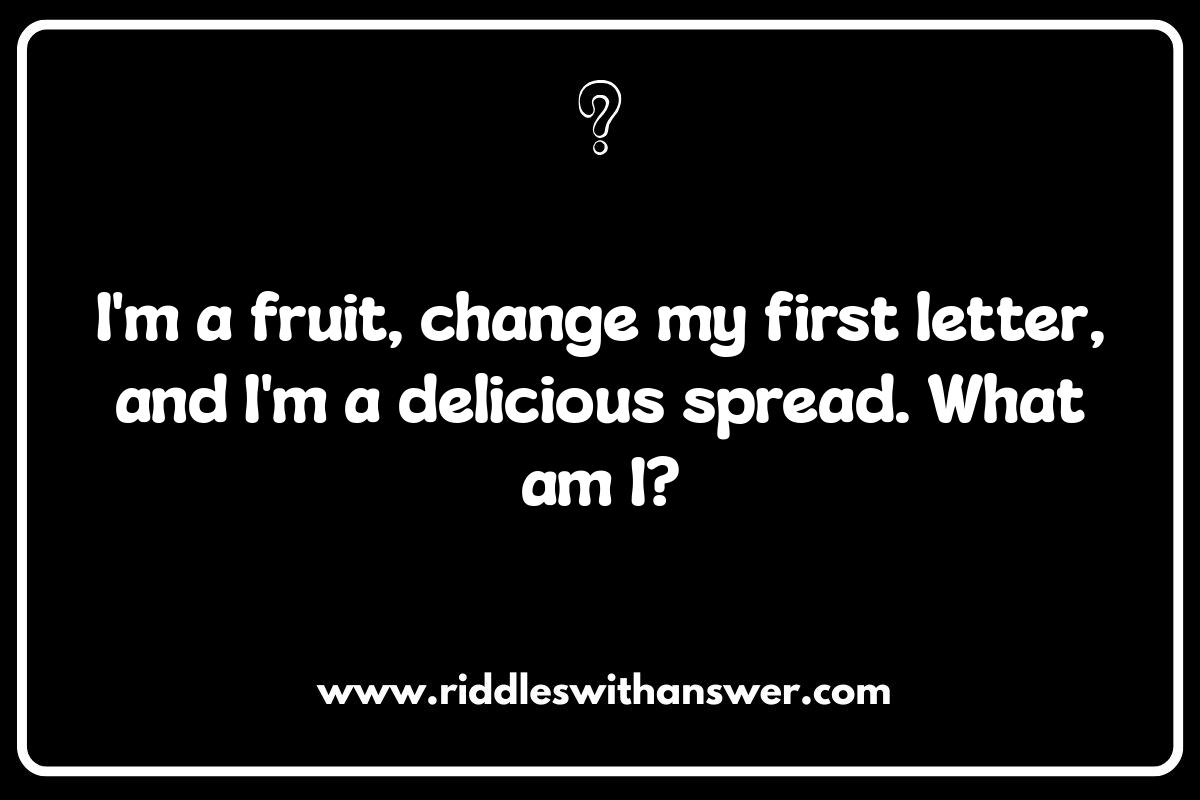
Riddle: I’m a fruit, change my first letter, and I’m a delicious spread. What am I?
Answer: Pear/Bear
Riddle: I’m a group of fish. Change my first letter, and I’m a sharp point. What am I?
Answer: Shoal/Awl
Riddle: I’m a type of weather. Remove my first letter, and I am not difficult. What am I?
Answer: Storm/Form
Riddle: I’m a place to sleep. Change my first letter, and I am a very large body of water. What am I?
Answer: Bed/Sea
Riddle: I’m a building made of glass. Take away my last letter and I am a window covering. What am I?
Answer: Greenhouse/Screen
Riddle: I am a bird, change my first letter and I can be used to cut wood. What am I?
Answer: Wren/Saw
Riddle: I am a type of meat. Remove my first letter, and I am something you can see with. What am I?
Answer: Ham/Eye
Riddle: I am a feeling, remove a letter and I am an illness.
Answer: Sadness/Madness
Riddle: I am a rodent, add a letter and I am a star.
Answer: Rat/Star
Riddle: I gain a letter and become a group, then I might be sweet for your soup.
Answer: Pea/Team
Riddle: I’m a season, take away two letters and I’m a criminal.
Answer: Autumn/Outlaw
Riddle: I’m a number, but add a letter and I’m a place to be.
Answer: Two/Town
Riddle: I am a type of nut. Change my first letter, and I am a small boat. What am I?
Answer: Pecan/Canal
Riddle: I am a type of insect. Change my first letter, and I am a place to keep animals. What am I?
Answer: Ant/Barn
Riddle: I am a long, narrow mark. Remove my first letter, and I am to be dishonest. What am I?
Answer: Line/Lie
Creating Your Own Clever Spelling Riddles
Unleash your inner wordsmith! Crafting spelling riddles is surprisingly fun. Think about words with silent letters, homophones, or tricky letter combinations. Then, weave clues that playfully hint at the spelling without giving it away directly. It’s a brain-teasing way to boost spelling skills and entertain friends!
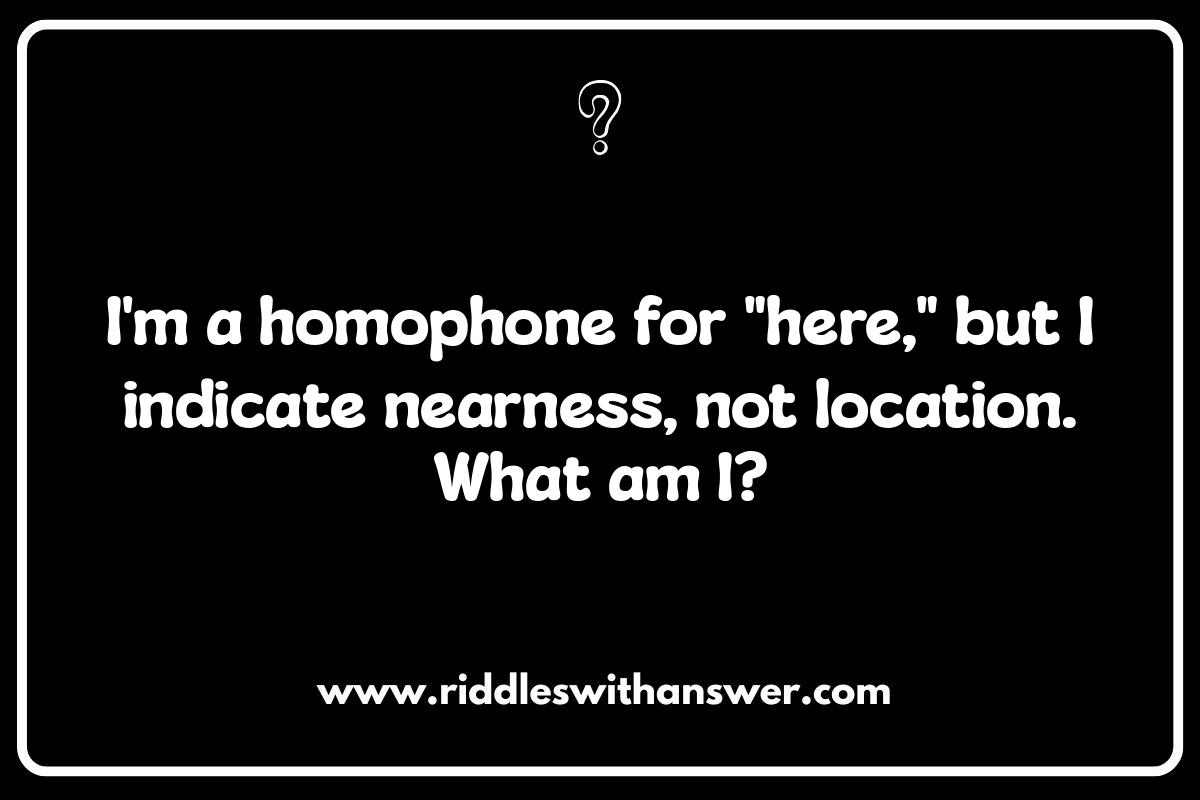
Riddle: I’m a homophone for “here,” but I indicate nearness, not location. What am I?
Answer: Hear
Riddle: I am a fruit. Change my first letter and I’m a precious metal. What am I?
Answer: Pear/Gold
Riddle: I’m a type of weather. Change my first letter, and I am a way to connect pieces of metal together. What am I?
Answer: Hail/Weld
Riddle: I am a word that means ‘to look intently’. Remove my last letter, and I become what you do with your eyes. What am I?
Answer: Stare/Star
Riddle: I am a group of people. Remove my first letter and I make you feel bad. What am I?
Answer: Crowd/Sad
Riddle: I am a number. Remove my first letter, and I am an adjective that describes a flat surface. What am I?
Answer: Eight/Flat
Riddle: I am a building material. Remove my first letter, and I am an injury. What am I?
Answer: Stone/Bone
Riddle: I am a part of your leg. Change my first letter, and I am what is used to knock down a tree. What am I?
Answer: Shin/Axe
Riddle: I am a type of footwear. Change my first letter, and I am what happens when water freezes. What am I?
Answer: Boot/Ice
Riddle: I’m a small rodent. Change my first letter, and I am a tool to catch fish. What am I?
Answer: Mouse/Net
Riddle: I am a farm animal. Change my first letter and I am a device used for sending radio signals. What am I?
Answer: Goat/Antenna
Riddle: I’m an adjective that describes being correct. Change my first letter, and I am a privilege. What am I?
Answer: Right/Might
Riddle: I am a type of tree. Change my first letter, and I am a musical instrument. What am I?
Answer: Pine/Harp
Riddle: I’m a place to live. Change my first letter, and I am what you do after planting a seed. What am I?
Answer: Home/Sow
Riddle: I am a type of insect. Change my first letter and I am a type of drink. What am I?
Answer: Bee/Tea
Spelling Riddles in Pop Culture: From Movies to Games
Spelling riddles aren’t just for classrooms! They’ve infiltrated pop culture, appearing in movies like National Treasure and video games like Professor Layton. These clever puzzles challenge us to think beyond simple definitions, using letter manipulation and wordplay to unlock secrets and solve mysteries, adding an extra layer of intrigue to…
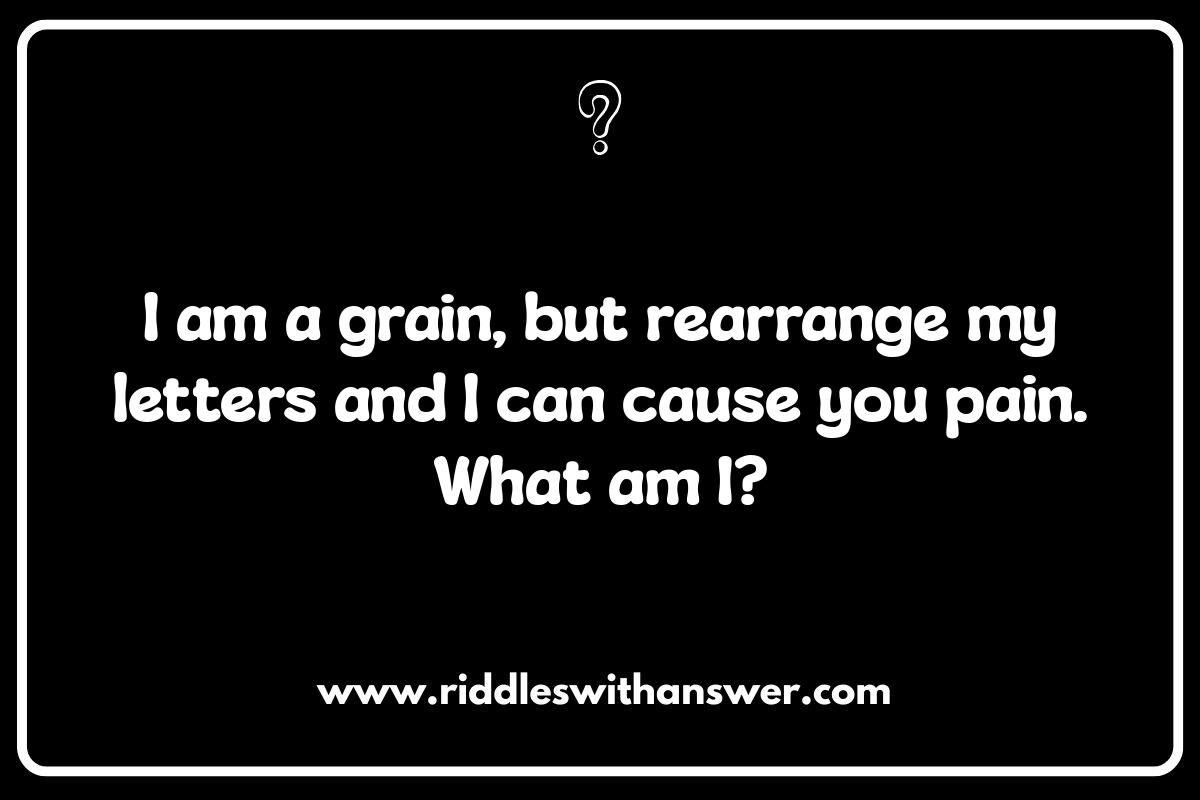
Riddle: I am a grain, but rearrange my letters and I can cause you pain. What am I?
Answer: Wheat
Riddle: I’m a fruit that’s also a color. Change my first letter to “B” and I express sorrow. What am I?
Answer: Orange
Riddle: I am a small insect, often found in a colony. Change my first letter, and I’m a place to keep money. What am I?
Answer: Ant
Riddle: I am a group of fish. Change my first letter and I’m a sharp point. What am I?
Answer: School
Riddle: I am a type of tree. Change my first letter, and I am a musical instrument. What am I?
Answer: Elm
Riddle: I’m a word that can mean both to allow and a type of evergreen tree. What am I?
Answer: Fir
Riddle: I am an item of footwear. Change my first letter and I am what happens when water freezes. What am I?
Answer: Shoe
Riddle: I can be found on your face and tell of your age but, change my first letter, and I’m a place to be kept in a cage. What am I?
Answer: Chin
Riddle: I’m a container for liquids. Change my first letter, and I am footwear. What am I?
Answer: Boot
Riddle: I am a feeling, remove a letter and I am an illness. What am I?
Answer: Pain
Riddle: I am a farm animal. Change my first letter and I am a device used for sending radio signals. What am I?
Answer: Hog
Riddle: I am a type of meat. Remove my first letter, and I am something you can see with. What am I?
Answer: Ham
Riddle: I’m a rodent, add a letter and I am a star. What am I?
Answer: Rat
Riddle: I’m a season, take away two letters and I’m a criminal. What am I?
Answer: Autumn
Riddle: I am a building made of glass. Take away my last letter and I am a window covering. What am I?
Answer: Greenhouse
The History and Evolution of Spelling Riddles
Spelling riddles, a playful blend of language and logic, boast a surprisingly rich history. From ancient word games to Victorian parlor amusements, these brain-teasers have evolved alongside language itself. They challenge us to think creatively about letters and their sounds, offering a delightful way to sharpen our linguistic wits across…
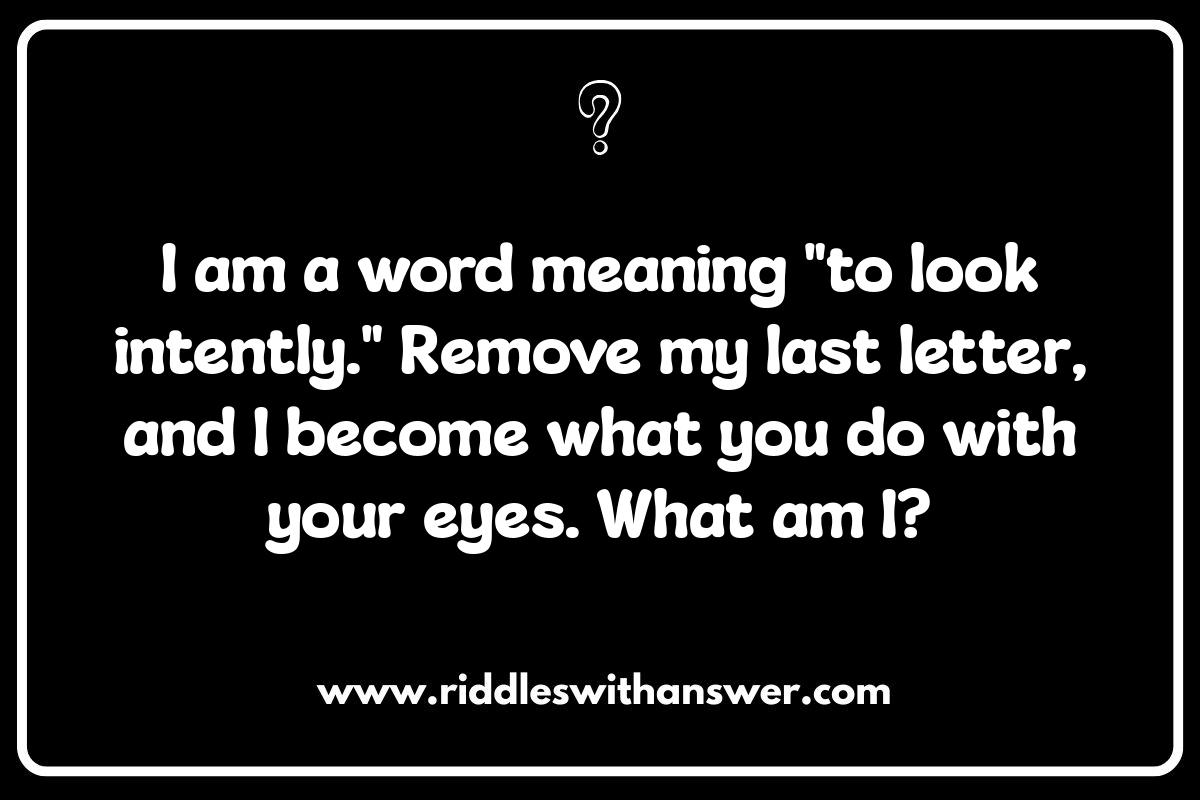
Riddle: I am a word meaning “to look intently.” Remove my last letter, and I become what you do with your eyes. What am I?
Answer: Stare/Star
Riddle: I am a feeling, remove a letter and I am an illness. What am I?
Answer: Pain/Pine
Riddle: I am a type of meat. Remove my first letter, and I am something you can see with. What am I?
Answer: Beef/Eye
Riddle: I am a type of tree. Change my first letter, and I am a musical instrument. What am I?
Answer: Oak/Flute
Riddle: I am a type of house. Change my first letter, and I am a tool used for moving snow. What am I?
Answer: Home/Shovel
Riddle: I’m a group of fish. Change my first letter, and I’m a sharp point. What am I?
Answer: School/Spike
Riddle: I’m a fruit that’s also a color. Change my first letter to “B” and I express sorrow. What am I?
Answer: Orange/Blorange (This is a play on words since Blorange is not a real expression, but it fits the riddle)
Riddle: I am a vegetable, add a letter and I am a place to keep animals. What am I?
Answer: Pea/Pen
Riddle: I am an item of footwear. Change my first letter and I am what happens when water freezes. What am I?
Answer: Shoe/Ice
Riddle: I’m a place to live. Change my first letter, and I am what you do after planting a seed. What am I?
Answer: Home/Hoe
Riddle: I am a type of insect. Change my first letter, and I am a place to keep money. What am I?
Answer: Ant/Bank
Riddle: I am a type of bird. Change my first letter, and I am a tool used for cutting wood. What am I?
Answer: Wren/Saw
Riddle: I am a place to sleep. Change my first letter, and I am a boat. What am I?
Answer: Bed/Sled
Riddle: I am a fruit. Change my first letter and I’m a precious metal. What am I?
Answer: Pear/Gold
Riddle: I’m a rodent, add a letter and I am a star. What am I?
Answer: Rat/Starr
Spelling Riddles and Cognitive Benefits: Sharpening Your Mind
Spelling riddles aren’t just fun wordplay; they’re brain boosters! Decoding these linguistic puzzles sharpens your focus, enhances vocabulary, and improves cognitive flexibility. Thinking creatively to unscramble letters exercises your mind, making spelling riddles a delightful and beneficial mental workout for all ages.
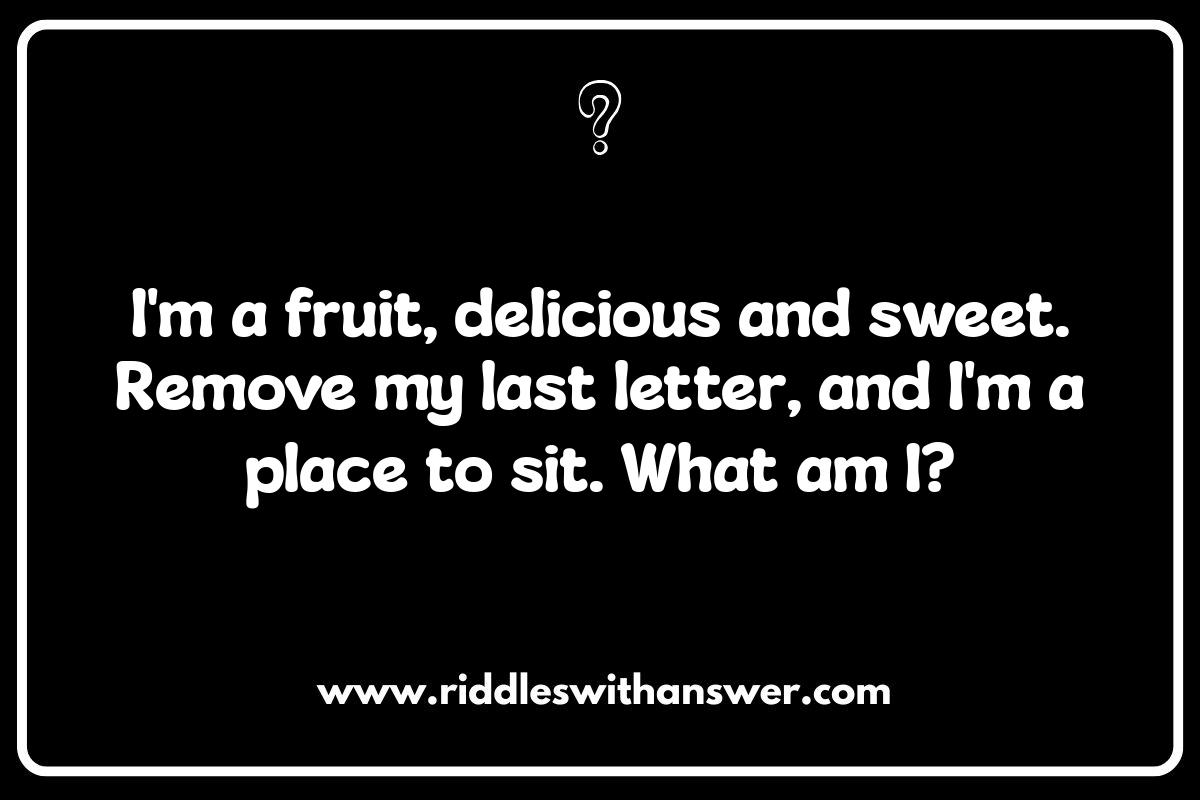
Riddle: I’m a fruit, delicious and sweet. Remove my last letter, and I’m a place to sit. What am I?
Answer: Pear/Pea
Riddle: I’m a group of people. Take away my first letter, and I’m what you feel when you’re sad. What am I?
Answer: Crowd/Sad
Riddle: I’m a word for what you read. Rearrange my letters, and I’m part of your face. What am I?
Answer: Story/Eyes
Riddle: I’m a form of transportation. Change my first letter and I become a card in a deck. What am I?
Answer: Train/Queen
Riddle: I am a number. Remove my first letter, and I become “even”. What am I?
Answer: Seven/Even
Riddle: I am a type of building. Change my first letter, and I’m a tool used for moving snow. What am I?
Answer: House/Shovel
Riddle: I’m a word that means to gain. Rearrange my letters, and I become a sharp pain. What am I?
Answer: Earn/Near
Riddle: I’m a type of weather. Remove my first letter, and I am not difficult. What am I?
Answer: Storm/Easy
Riddle: I am a type of meat. Remove my first letter, and I am something you can see with. What am I?
Answer: Ham/Eye
Riddle: I’m a small rodent. Change my first letter, and I am a tool to catch fish. What am I?
Answer: Mouse/Louse
Riddle: I’m a container for liquids. Change my first letter, and I am footwear. What am I?
Answer: Jug/Lug
Riddle: I’m a word that describes being correct. Change my first letter, and I am a privilege. What am I?
Answer: Right/Might
Riddle: I am a type of tree. Change my first letter, and I am a musical instrument. What am I?
Answer: Elm/Harm
Riddle: I’m a type of insect. Change my first letter, and I am a place to keep animals. What am I?
Answer: Ant/Barn
Riddle: I’m a place to sleep. Change my first letter, and I am a boat. What am I?
Answer: Bed/Sled






